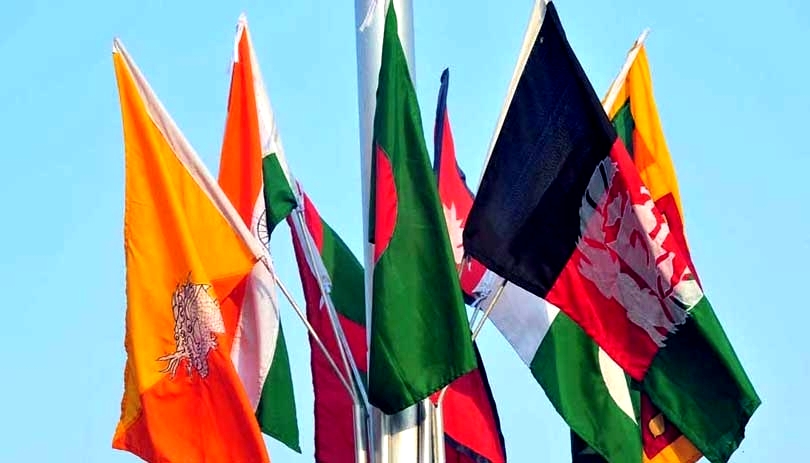New Delhi: Political developments in the Maldives and Sri Lanka, the Rohingya refugee crisis arising out of Myanmar, mending ties with Nepal’s new leadership and the situation in Afghanistan – neighbourhood diplomacy took up much of India’s time in the year just ending.
New Delhi’s Neighbourhood First Policy ended on a high note, however, with newly-elected Bhutanese Prime Minister Lotay Tshering making India the destination of his first foreign visit.
Maintaining the narrative of the India-Bhutan ties, Prime Minister Narendra Modi, following a meeting with Tshering Friday, announced that New Delhi will contribute Rs 4,500 crore to the Himalayan kingdom’s 12th Five-Year Plan that runs from 2018 to 2023.
India is a leading development aid partner for Bhutan. There are a number of institutional mechanisms between the two countries in areas like security, border management, trade, economy, hydroelectricity, development cooperation and water resources.
Tshering, on his part, invited Modi to visit Bhutan and inaugurate the 720-MW Mangdechhu hydro-power project, being built with Indian aid and work on which is nearing completion.
New Delhi has already set up three hydro-power projects in Bhutan with a total capacity of 1,416 MW, which are operational. About three-fourth of the power generated is exported to India and the rest is used for domestic consumption.
The year, however, started off on a wrong note in the neighbourhood with then Maldivian President Abdulla Yameen, seen to have been distancing himself from India and leaning towards China, imposing a state of emergency February.
Yameen’s move was in defiance of a Supreme Court ruling that ordered the release of nine opposition leaders, including former President Mohammed Nasheed.
Pro-India Nasheed, who was in exile at that time, requested New Delhi to send an envoy, “backed by its military”, to secure the release of judges and political detainees, including former President Maumoon Abdul Gayoom.
Though the Indian Army did not set its boots on the Indian Ocean archipelago nation, New Delhi kept calling for restoration of all democratic institutions there.
The crisis came to an end September when Ibrahim Mohammed Solih, put up as the joint opposition candidate, defeated Yameen in the presidential election.
Modi attended Solih’s swearing-in ceremony November 17. following which the latter came to India earlier this month on his first official visit abroad.
Following a bilateral meeting here, New Delhi extended lines of credit worth $1.4 billion to to the Maldives and both sides agreed to to maintain peace and security in the Indian Ocean region by deepening their bilateral cooperation.
In the end, as one former diplomat put it, India’s circumspection on the Maldives crisis paid off.
In Sri Lanka, political turmoil was sparked when President Maithripala Sirisena sacked Ranil Wickremesinghe as the Prime Minister and appointed former President Rajapakse in his place October.
Wickremesinghe’s United National Front party alleged that the removal was “unconstitutional” and said the new caretaker government could not continue in office as it had been defeated in no-confidence motions.
The nearly two-month-old political impasse only ended when Rajapaksa stepped down December 15 amid rising protests and Wickremsinghe was sworn in as the Prime Minister the next day.
Sources here said new Delhi avoided knee jerk reactions or responses to these developments.
India also reset its ties with Nepal through a visit by Modi to the Himalayan nation in May, his first after K.P. Sharma Oli became the Prime Minister.
During the visit, both sides agreed to boost trade and economic links, connectivity via air, land and water, people-to-people ties, with Modi declaring that India will work like a sherpa in the Himalayan nation’s development endeavours.
This was significant given that there was a chill in India-Nepal ties during Oli’s earlier stint between October 2015 and August 2016 when a border blockade blamed on New Delhi crippled Nepal’s economy.
There were also perceptions that Oli was leaning more towards China than India.
In the east, the Rohingya refugee crisis emanating out of Myanmar kept India on its toes.
Over 730,000 Rohingyas, whom Myanmar does not recognise as its citizens, have sought refuge in Bangladesh since August 2017 following a military campaign against the minority community in Rakhine State.
With India being the only country sharing its borders with both Myanmar and Bangladesh, New Delhi’s role in the crisis became crucial.
Apart from sending humanitarian aid to the refugees in Bangladesh, India signed a development programme for Rakhine State late last year which was designed to assist the Myanmar government to build housing infrastructure for return of the displaced persons.
Earlier this month, India handed over the first 50 such housing units to Myanmar during the course of President Ram Nath Kovind’s visit there with that country’s leadership appreciating New Delhi’s role in the rehabilitation of the refugees.
According to sources here, India consciously took a nuanced position on the issue.
In terms of bilateral ties, India continued its role as a key development aid partner of Myanmar, working on major infrastructure projects.
India managed to hand over the Sittwe port and the Paletwa inland water terminal, two major elements of the Kaladan Multi-modal Transport Project connecting Mizoram in India, to the Myanmar side.
With Bangladesh, ties continued to remain positive as has been the case under the prime ministership of Sheikh Hasina. With the country going to polls Sunday, what is being seen as positive is that India has not figured in any prominent manner in the run-up.
Three India-aided projects in the areas of power supply and railway connectivity were also dedicated to the people of Bangladesh this year.
The situation in Afghanistan also kept drawing India’s attention. Though New Delhi has maintained that the peace process there should be Afghan-led and Afghan owned, India continued to play a key role in the reconstruction process.
According to sources, though, all all countries view India’s participation in the peace process as important.
IANS
Also Read:
